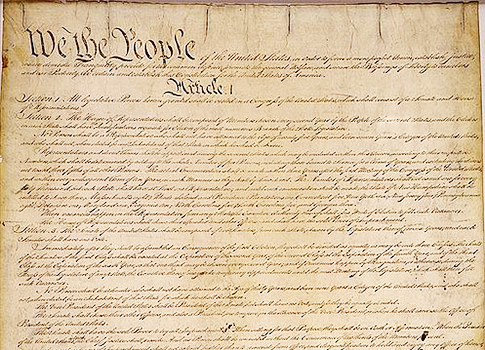Two Pennsylvania teachers are fighting the state’s largest teachers union for interfering with their charitable giving.
The teachers allege in a suit filed in district court that the Pennsylvania State Education Association (PSEA) is blocking them from exercising their right to donate union dues money to charity. Pennsylvania allows religious objectors to cut ties with unions as long as they donate an equivalent agency fee payment to charity. That money is given to the union, which is then supposed to send it to the charity of the teacher’s choosing.
Jane Ladley, an elementary school teacher for 25 years before retiring in June, said that the union prevented her from directing her $435 donation to a scholarship fund to teach high school seniors about the Constitution because it was "too political."
"Since when did the Constitution become political? It’s a legal document that is the foundation of this country," Ladley said. "I had to have their approval for where my money went, one that would fall in line with their thinking."
Ladley, 61, began teaching in the 1970s and was a member of the teachers union for seven years. She put her career on hold to raise her children before returning to the workforce in 1996. This time, she refused to join after discovering that the union "funneled money to Planned Parenthood."
"As a Christian and as a mother, that was abhorrent to me," she said.
Union officials rejected her decision then sent her a list of a dozen large charities, many of which spend thousands of dollars each year on political lobbying. She said the union is still trying to impose its agenda on her.
"They can give their members’ money to the politics and the agenda that they think are correct, yet I cannot," she said.
The PSEA did not return request for comment.
The union contends that it has every right to monitor the donations because Ladley’s donations represent a debt owed to the union and, thus, union property.
"Pennsylvania’s law imposes an additional procedural requirement in escrowing fees of religious objectors during the pendency of the feepayer and union’s discussion on a mutually-acceptable, nonreligious charity to receive the fees," the union said in a legal brief. "A fair share fee represents a private debt obligation owed by a nonmember to a union who performs bargaining services on the feepayer’s behalf."
Nate Bohlander, an attorney with the non-profit Fairness Center who is representing Ladley, said that the union may handle the money, but that doesn’t entitle them to ownership of the money, just as a person’s bank deposit belongs to the depositor. The union’s actions, he said, are meant to have a "chilling effect" on the 200 Pennsylvania teachers who opt out of the union.
"You owe a debt to a union for services rendered, but this is not a fair share payment [for collective bargaining]. The law says if you object, you are severing ties with the union," he said. "It never becomes union money. It never becomes their property. And it certainly is not a debt."
The PSEA rejected another teacher’s attempt to donate money to the National Right to Work Legal Defense Foundation because the non-profit group had previously sued the union.
While the donation may seem controversial to the union, Bohlander said it meets state law, which bars donations to explicitly religious charities.
This isn’t the first time a union has faced legal scrutiny for its handling of charitable contributions from objectors.
A Long Island teachers union pocketed hundreds of dollars that one teacher directed to the Cystic Fibrosis Foundation and the Now I Lay Me Down to Sleep Foundation, a charity that helps parents cope with the death of a child. The union settled with the woman in January.
Patrick Semmens, spokesman of the National Right to Work Foundation, which represented the Long Island teacher, said that such schemes demonstrate why workers need individual protections, rather than offsetting measures, such as charitable donations.
"While sending money to a charity instead of to union coffers is better than being forced to choose between your religious conscience and your job (since they will be fired for not paying), disputes over which charity the money will go to and if they send it show why Right to Work is still the best solution to protecting workers from having their money used to fund union activities they find contrary to their beliefs," he said.
Teachers have also encountered threats of intimidation for how they donate their time to political candidates. Kristen Fisher, president of the Anaheim Elementary Education Association, sent an email to her members ordering them not to campaign with candidates who had not been endorsed by the union.
"AEEA officially endorse(d) the candidates our high school counterpart (ASTA) endorsed. Please cease and desist engaging in activities that weaken our union—specifically, wearing AEEA T-shirts while walking for nonendorsed candidate(s). This is not about your freedom to support candidates of your choice. This is about our association, our union," the email said.
The emails drew fire from former Democratic state Sen. Gloria Romero.
"The leaked email, while pertaining to a local Anaheim school board race, raises implications of the rights of union members who in states like California are mandated by law to pay an annual membership assessment to the union to fund collective bargaining," Romero wrote in the Orange County Register. "First Amendment rights have become a closely watched political and legal issue when funds are used for political candidates and causes which the members do not support."
Ladley did not imagine that she would spend the first year of her retirement fighting against the teachers union, but she is committed to seeing the case through.
"Many teachers are not comfortable coming forward and speaking out. I’m doing it for them," she said. "They need to know this option exists and they need to know about the union’s policies."
